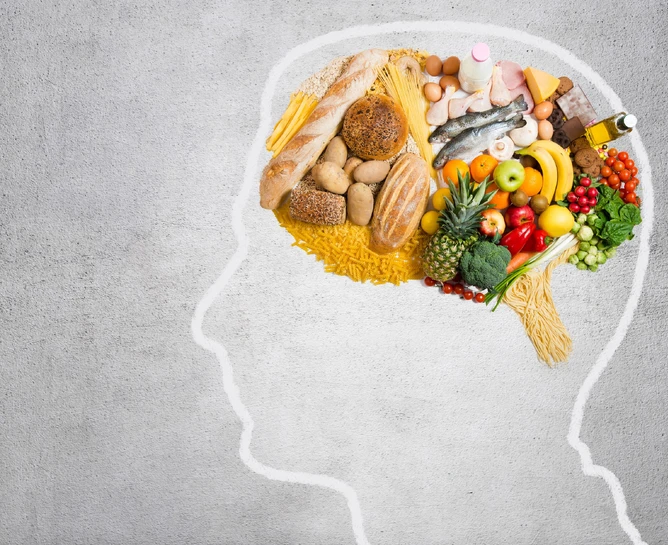With the surge in mental health awareness and activism in recent years, the intricate relationship between nutrition and mental health has garnered significant attention. Much like the connection between physical health and diet, emerging research now proves the profound impact of diet on our mental wellness and processes. This article explores this link as well as practical tips for optimizing mental wellness through nutrition.
The Gut-Brain Axis: A Vital Link
The gut-brain axis, a bidirectional communication system between the gastrointestinal tract and the brain, plays a crucial role in mental health. The gut is known for its vast network of neurons which remains under-researched till today, even though it is so significant that it has been nicknamed the “second brain”. The gut also produces neurotransmitters like serotonin, which regulate mood. Approximately 90% of serotonin is produced in the gut, emphasizing the importance of gastrointestinal health in mental well-being.
A balanced diet rich in fibre supports a healthy gut microbiome (the diverse community of microorganisms living in the digestive tract). These microbes influence the production of neurotransmitters and modulate inflammation, both of which are linked to mental health disorders such as depression and anxiety. Diets high in processed foods and low in fibre can thus disrupt the gut microbiome, inadvertently leading to increased inflammation and altered neurotransmitter production.
Core Nutrients for Mental Health
Several nutrients have been identified as important for maintaining mental health. They include:
- Omega-3 Fatty Acids: Found in fatty fish, omega-3 fatty acids are essential for brain function, their anti-inflammatory properties and are associated with a reduced risk of depression and cognitive decline.
- Vitamin B: B vitamins, including B6, B12, and folate, such as are found in leafy greens, legumes, eggs, and fortified cereals are vital in producing neurotransmitters and regulating homocysteine levels, which, when elevated, are linked to depression and cognitive impairment.
- Vitamin D: Often referred to as the “sunshine vitamin,” vitamin D is crucial for brain health. Deficiency in vitamin D has been linked to mood disorders, including depression. Sunlight exposure and foods like fatty fish, fortified dairy products, and egg yolks can help maintain adequate vitamin D levels.
- Magnesium: Low magnesium levels have been associated with an increased risk of depression and anxiety. This essential mineral is involved in over 300 biochemical reactions in the body, including those that regulate mood and can be found in nuts, seeds, whole grains, and leafy greens.
- Antioxidants: Vitamins C and E protect the brain from oxidative stress, which can damage brain cells and contribute to mental health disorders. Berries, nuts, and colourful fruits and vegetables are excellent sources of these antioxidants.
Dietary Patterns and Mental Health
Beyond individual nutrients, overall dietary patterns significantly affect mental health. Research suggests that high consumption of fruits, vegetables, whole grains, nuts, seeds, and olive oil, known as the Mediterranean diet, is associated with a lower risk of depression and cognitive decline. Conversely, the Western diet, high in processed foods, refined sugars, and unhealthy fats has been linked to an increased risk of mental health disorders, and statistics on mental health complaints in the West attest to this. This diet has also been linked to inflammation, oxidative stress, and disruptions in the gut microbiome, all of which negatively affect mental health. It would thus be prudent for Africans to adopt the former in place of the latter when it comes to cross-cultural cuisine.
Practical Tips for a Mental Health-Friendly Diet
Due to the typically busy schedule of the student, and the general economic state eating well poses a challenge to many, however, it remains necessary for total well-being. Below are some practical tips to remember when meal planning for optimal health:
- Eat a Variety of Whole Foods: Incorporate a wide range of fruits, vegetables, whole grains, lean proteins, and healthy fats into your diet to ensure you get all the essential nutrients.
- Focus on Omega-3s: Include fatty fish such as tuna, salmon, herring (shawa), mackerel (titus) and as well as walnuts in your diet to boost omega-3 intake.
- Limit Processed Foods: Reduce consumption of processed foods, sugary snacks, and unhealthy fats.
- Stay Hydrated: Proper hydration is key for overall health, including mental well-being. Aim to drink at least eight glasses of water a day.
- Consider Probiotics: Probiotic-rich foods like yoghurt can support a healthy gut microbiome, which in turn benefits mental health.
- Meal Timing: Regular meal patterns help maintain stable blood sugar levels, which can prevent mood swings and energy crashes.
- Seek Professional Advice: If you have specific dietary concerns or mental health issues, consult a healthcare professional or registered dietitian for personalized guidance.
In conclusion, the connection between nutrition and mental health is as real as the connection between diet and physical health. A balanced diet rich in essential nutrients is essential to total wellness. By prioritizing whole foods, healthy fats, and a variety of nutrients, individuals can positively influence their mental health and overall quality of life.
Oreoluwa Opeolu

